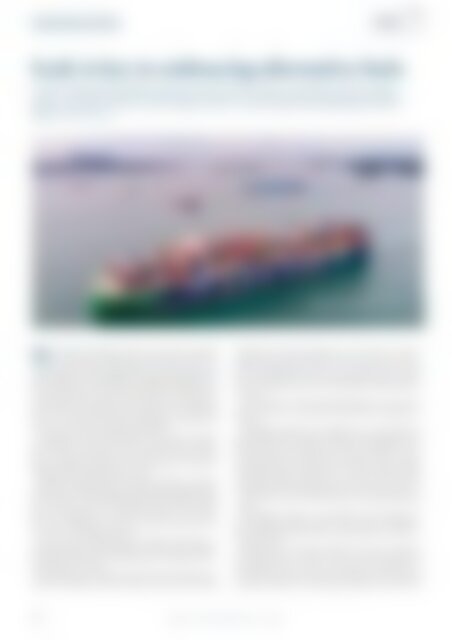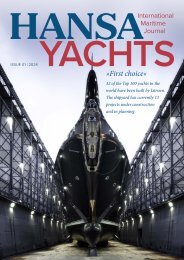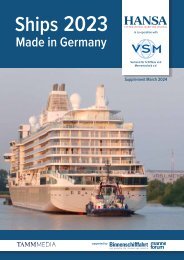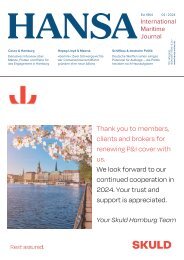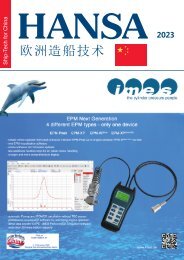HANSA 11-2022
Rostocker Großmotorentagung | Tankmessung | Bunkermarkt & Kraftstoffe | Makler & Eisbeinessen | Russland-Sanktionen | MSC | Chinese Leasing | HANSA-FORUM 2022
Rostocker Großmotorentagung | Tankmessung | Bunkermarkt & Kraftstoffe | Makler & Eisbeinessen | Russland-Sanktionen | MSC | Chinese Leasing | HANSA-FORUM 2022
Sie wollen auch ein ePaper? Erhöhen Sie die Reichweite Ihrer Titel.
YUMPU macht aus Druck-PDFs automatisch weboptimierte ePaper, die Google liebt.
SCHIFFFAHRT | SHIPPING<br />
Scale is key to embracing alternative fuels<br />
As the world and the global industries head towards carbon neutrality by 2050, energy<br />
majors and ship owners are still trying to reach a common ground regarding alternative<br />
fuels. By Patrick Lee<br />
An important aspect of CMA CGM’s<br />
strategy is the use of LNG<br />
© CMA CGM<br />
While liquefied natural gas (LNG) is becoming more available<br />
as a marine fuel worldwide, the picture is less certain for methanol,<br />
biofuels, ammonia and hydrogen, which have been touted<br />
as alternative fuels. At the Singapore International Bunkering Conference<br />
(SIBCON), CMA CGM’s vice-president for bunkering and<br />
energy transition, Farid Trad, said that while the French liner operator<br />
already has LNG-fuelled container ships, there is no single fuel<br />
that can achieve decarbonisation alone. Farid said, »We believe that<br />
there’s no one solution. The needs for shipping are so massive that<br />
we need to work on LNG, biofuels and methanol.«<br />
In September, CMA CGM launched a 1.5 bn $ fund to support<br />
the production of alternative fuels. The Marseilles-based company<br />
has 31 e-methane ready ships in its fleet and it we will have 77 such<br />
ships by end-2026. In August, CMA CGM ordered six 15,000 TEU<br />
methanol-fuelled ships for delivery in 2025.<br />
Shell Marine president Melissa Williams said that her company<br />
will produce and transport green ammonia and hydrogen, but there<br />
are cost concerns: »We will produce green ammonia and hydrogen,<br />
but we will not use these for bunkering at this time. When you talk<br />
about all the things that are needed to bring these to the market,<br />
that is one challenge that we haven’t overcome at this point, but<br />
we’re open to technological advances.«<br />
For this reason, Denmark-based AP Moller Maersk group is<br />
looking at methanol as a decarbonisation solution, and its substantial<br />
orderbook for methanol-powered ships is a strategy to encourage<br />
production of the fuel.<br />
Berit Hinnemann, AP Moller-Maersk’s Head of Decarbonisation<br />
Business Development and interim Head of Green Fuels Sourcing,<br />
emphasized that while technology isn’t an issue, there is still inadequate<br />
output of biomethanol. She said, »For projects to be developed,<br />
the demand has to be there so our approach was to order<br />
vessels, knowing full well that very small amounts (of green methanol)<br />
are produced today and this will require massive efforts to<br />
scale it up.«<br />
Maersk Line has 19 methanol-fuelled boxships on order, including<br />
six 17,000 TEU vessels ordered at Hyundai Heavy Industries on<br />
5 October.<br />
Hinnemann continued, »Our approach is to work with companies<br />
in different parts of the world who are developing green methanol<br />
projects for our offtake, to enable the companies to move<br />
forward with green methanol projects. We have a feeder vessel operating<br />
from next year onwards and a European energy company<br />
will develop the green methanol for it. For large vessels, we intend<br />
to fuel them with green methanol as soon as we can. We know that’s<br />
a challenge but we’re working intensely on this with our partners.«<br />
That is not to say that no ship owners are experimenting with<br />
biofuels.<br />
Stena Bulk’s manager for sustainability and transformation,<br />
Peter Bjorkborg, said the tanker owner has been trialling biofuels,<br />
although its ships have been using methanol as a clean solution<br />
since 2015.<br />
Bjorkborg said, »We believe biofuels work and we should be<br />
able to get past the trial phase. We’re not concerned about the<br />
technological issues, we’re not concerned about operational issues<br />
either, more about scaling, more about the commercial side<br />
of things, standards. If we can get those things to move forward,<br />
30 <strong>HANSA</strong> – International Maritime Journal <strong>11</strong> | <strong>2022</strong>


